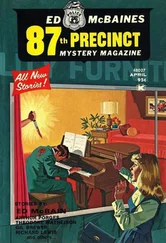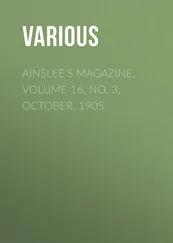Various - Donahoe's Magazine, Volume 15, No. 4, April, 1886
Здесь есть возможность читать онлайн «Various - Donahoe's Magazine, Volume 15, No. 4, April, 1886» — ознакомительный отрывок электронной книги совершенно бесплатно, а после прочтения отрывка купить полную версию. В некоторых случаях можно слушать аудио, скачать через торрент в формате fb2 и присутствует краткое содержание. Издательство: Иностранный паблик, Жанр: periodic, foreign_edu, на английском языке. Описание произведения, (предисловие) а так же отзывы посетителей доступны на портале библиотеки ЛибКат.
- Название:Donahoe's Magazine, Volume 15, No. 4, April, 1886
- Автор:
- Издательство:Иностранный паблик
- Жанр:
- Год:неизвестен
- ISBN:нет данных
- Рейтинг книги:5 / 5. Голосов: 1
-
Избранное:Добавить в избранное
- Отзывы:
-
Ваша оценка:
- 100
- 1
- 2
- 3
- 4
- 5
Donahoe's Magazine, Volume 15, No. 4, April, 1886: краткое содержание, описание и аннотация
Предлагаем к чтению аннотацию, описание, краткое содержание или предисловие (зависит от того, что написал сам автор книги «Donahoe's Magazine, Volume 15, No. 4, April, 1886»). Если вы не нашли необходимую информацию о книге — напишите в комментариях, мы постараемся отыскать её.
Donahoe's Magazine, Volume 15, No. 4, April, 1886 — читать онлайн ознакомительный отрывок
Ниже представлен текст книги, разбитый по страницам. Система сохранения места последней прочитанной страницы, позволяет с удобством читать онлайн бесплатно книгу «Donahoe's Magazine, Volume 15, No. 4, April, 1886», без необходимости каждый раз заново искать на чём Вы остановились. Поставьте закладку, и сможете в любой момент перейти на страницу, на которой закончили чтение.
Интервал:
Закладка:
The convent is built in the shape of the letter S, with the new building recently added for the pupils – a long line of class-rooms and music closets below and the dormitories above admirably arranged so that each girl is enclosed in a kind of cell, or cabin, numbered on the door outside, with a general ceiling. It is original and much better than the old system, by which twenty or thirty girls felt themselves in a general bedroom. This building has proved the most expensive of all, and the undertaking leaves the community considerably in debt and if any of my readers feel sufficiently impressed by the endurance, courage, and self-sacrifice I have indicated in this short sketch to desire to be of any help in a most deserving cause, donations to enable the convent to pay off its debt will be very gratefully received by the superior. Their charities and hospitalities are necessarily great, and their isolated position precludes them from the enjoyment of those resources and assistances which the communities in Catholic countries may justly rely upon.
The features of the island of Tenos gather beauty with familiarity, and the inhabitants are as simple and pure and primitive as the old ideal of Arcadia without, however, the picturesque shepherd costume and crook. They have the greatest respect for the French nuns, teach their little brown-faced babies to salute them by kissing their hand, and with the untutored courtesy of their peasant race are willing and anxious to render the sisters whatever service lies within their power. They wonder greatly at the taste and artistic beauty of the convent grounds; at the perfect neatness and cleanliness of all the domestic details, and those who have come under the personal influence of the nuns are already endeavoring to beautify their own homes. A servant man who had worked in the convent has gradually turned his pig-sty home into a charming little cottage, with a neat terrace covered with trellised vines, the poles which support it wreathed in fragrant basilica. He is quite proud when you stop in the dirty village to admire the incongruous effect of his pretty house, and tells you frankly that he owes his taste to " la Mère Assistante ."
The influence of these ladies throughout the primitive island is remarkable, and by the simple-minded peasants who have benefited so greatly by their charity and labors, are gratefully recognized as the one oasis of civilization in their midst. Unfortunately they are not rich enough to give any more practical evidence of gratitude than sincere love and devotion.
Hannah Lynch.It has been noticed that boiler explosions are especially frequent in the morning. Take, for example, an engine which works during the day with steam at six atmospheres. The workmen leave the factory at seven o'clock P.M., and about six o'clock the fireman reduces his fires and leaves the boiler with the gauge at four atmospheres. On returning the next morning at half-past five, he generally finds the gauge at 1.5 or two atmospheres, with a fine water level. He profits by the reserved heat, which represents a certain expenditure of fuel; as an economist he utilizes it, and drives his fires, to be ready for the return of the workmen, without suspecting the dangers concealed in the water which has been boiling all night. He does not feed his boilers, because they are at a good level. In other words, he prepares, unconsciously, the conditions which are most favorable to superheating, and a consequent sudden and terrible explosion, which will be attributed to some mysterious and unknown cause.
Southern Sketches
There are two railways leading from Havana to Matanzas, one called the via Baya (Bay line) runs along the sea coast through a mountainous and romantic country. This is much shorter than the other route, which passes through the interior, affording the traveller an excellent opportunity of observing the rural tropical scenes of the island.
I decided to go the latter way by the train, which was to start from the depot near the Campo de Marte at 2.40 P.M. The fare from Havana to Matanzas either way, second-class, is $7.10 in Cuban currency. This class is well patronized by respectable travellers. Negroes, Chinese and the poorest Cubans take the third. The carriage in which I rode was built and furnished somewhat like those in the United States, except that the seats had no cushions, and the windows no glass. The train started at the appointed time, and we soon found ourselves rushing through narrow streets, past many colored buildings.
The Yanza, or Chinese quarter, presents an extremely wretched and filthy appearance, thus contrasting wonderfully with the splendid attractions of other parts of the city. The suburbs were soon reached, and the hot and dusty town gave place to the clear, refreshing country. Hurrying past the gardens of the captain-general, with their avenues of royal and cocoa palms, their fountains, waterfalls and pyramids of flowers, we beheld ahead verdant, green hills, beautiful mansions, and here and there very ancient stone buildings, forts, cottages and gardens. All kinds of vegetables and blossoming plants were seen growing down to the railroad track. There were waving meadows through which streams of a pale blue, transparent tint, wandered gracefully, bending bamboos, slanting palms, and thousands of wild vines full of flowers grew on the banks. As the train rushed by these silent Edens, the splendid paroquets and other gorgeous birds, browsing goats, mules and cattle started at the sound, paused in wonder as we passed, and then relapsed into their previous occupations. Half-naked Chinese farm-hands carried water in buckets suspended from yokes fixed on their shoulders. We saw fields of corn and sugar-cane stretching away for miles. Here and there, out of this bright, green sea arose an odd planter's mansion, painted sky-blue with its pillars, railings, and towers of white and gold. One of these houses stood a few hundred feet from the track. It was two stories high, solid and Corinthian in its architecture, of a cream color, while its lofty colonnades were painted in delicate crimson and blue. Large, costly vases, full of flowers, decorated the entrance, and this was reached through an antique gateway that was covered with roses. Now we swept by large banana groves whose trees were loaded with fruit. We rushed by rocks, dells and fields adorned with grasses as glossy as satin and of every color. We saw fruit trees of all kinds, stone fences covered with century plants, cacti and other flowers; enchanting vales, fields of shrubbery, and avenues of royal palms over fifty feet high, ever stately and beautiful whether in groups or alone.
The soil of the island is of a deep red color, and contrasts splendidly with the rich green of the trees. The cattle looked fat and large, and numerous queer-looking domestic fowl were seen in the fields. The "Ingenio" or sugar plantation, was readily recognized, whether rising above the cane fields or partly shaded by trees. It consisted of a group of buildings generally painted white, out of which arose a very tall furnace chimney. Negroes and Chinese were seen steering oxen with carts full of cane from the fields to the mill.
The chief agricultural industry of the island consists in the cultivation of this product. Cane fields almost boundless in extent appeared here and there in the luxuriant landscape. The railroad stations at the villages where we stopped were crowded with hogsheads of sugar and molasses, ready to be sent to Havana, and shipped from there to foreign seaports. Black and white coolies were noticed cutting the cane and often greedily devouring it, while the rich juice ran down their naked chests. This could be had for almost nothing at the depots from the dealers who also sold oranges, pineapples, tamarinds, caimetoes, cocoanuts and other luscious fruit. I stepped out of the cars at Guines, where the train was to stop for a few minutes, and bought for a couple of cents two cocoanuts, each as large as an ordinary sized mushmelon. The rind was perfectly green, soft and easily broken, the juice fresh and delicious, and the pulp was tender and sweet, much richer in flavor than that which one eats in the North. On the journey I often noticed the tall and handsome ceiba tree, with its smooth trunk and gracefully-spreading limbs and branches full of verdant leaves. Now we passed by the house of the montero , or sporting peasant. It was a rather rude-looking dwelling thatched with palm leaves, and open at the sides to the mild, pure air. This montero usually possesses but a few acres, which yield him fruit, cane and vegetables enough to make his life easy and contented. The streams give him lots of fish, and the sunny blue skies look down with favor upon him, as he languidly reclines on the grass and eats his melting bananas. The sisal hemp fields look very attractive, and as the train rushes on, we catch glimpses of laughing children, who are playing amid a wilderness of roses. We soon reached the town of Catalina. It looked wonderfully charming, with its handsome church and houses, surrounded by groves of bananas and oranges. We saw pine apples growing in the gardens. The colored leaves of these plants were conspicuous for their variety and beauty. The motion of the train developed a steady breeze, and this, laden with the odors of millions of blossoms and fruits, afforded us the greatest delight. The eye could never tire of the beauty of these tropical scenes. When it withdrew from immediate objects, it wandered away to rest with delight on the softly lit-up mountains, crowned with palms. How splendid those mountains looked, covered to their summits with verdure, and now as the sun was sinking, becoming enveloped in purple and crimson mists. The glory of the rosy sunset on field and wood was brought into deeper relief by the shadows of the trees and hills. On getting on the rear of the train, I was enabled to take in the receding landscape and the views to the right and left. The whole seemed a poetic reality, a region of luxurious delight. The heavens assumed most exquisite hues, forms and colors peculiar to tropical skies. Clouds lately gorgeous, passed into shapes still brighter, and their softness, delicacy and glory seemed to illumine the landscapes. The grand, royal palms which carried one's thoughts to the Holy Land and the time of our Saviour, the mountains tipped with the moving mists, the peaceful valleys where droves of fat cattle feasted, the gaps in the hills, the groves of fruit trees and the flowing streams – all rested tranquilly and brightly under the belts of gold in seas of blue and green, the tongues of fire, rivers of light, silvery hills, purple and crimson isles, castles, vases, columns and thrones that were traced in the clouds. No language can sufficiently describe the beauty of this tropical region; it must be seen to be adequately appreciated.
Читать дальшеИнтервал:
Закладка:
Похожие книги на «Donahoe's Magazine, Volume 15, No. 4, April, 1886»
Представляем Вашему вниманию похожие книги на «Donahoe's Magazine, Volume 15, No. 4, April, 1886» списком для выбора. Мы отобрали схожую по названию и смыслу литературу в надежде предоставить читателям больше вариантов отыскать новые, интересные, ещё непрочитанные произведения.
Обсуждение, отзывы о книге «Donahoe's Magazine, Volume 15, No. 4, April, 1886» и просто собственные мнения читателей. Оставьте ваши комментарии, напишите, что Вы думаете о произведении, его смысле или главных героях. Укажите что конкретно понравилось, а что нет, и почему Вы так считаете.












